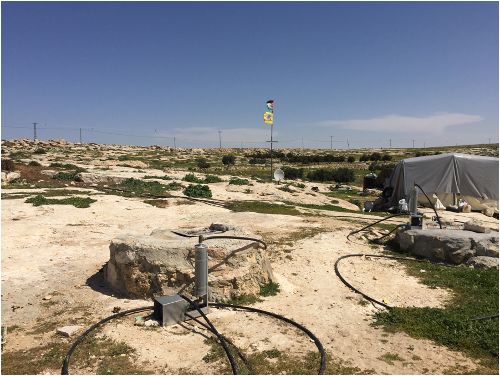Interviews were conducted at the office of the Union of Agricultural Work Committees (UAWC)1 with Ibrahim el-Hathalen, Nasser Nwaja, and Suleiman Addar. Many thanks to Dimitri Khashram and Wissam Jabarin for translating and to the UAWC for arranging the interviews.

Palestinian farmland in the village of Susiya. On the hill overlooking the Palestinian land is an Israeli settlement of the same name (Photo: Ravenel Godbold)
Working the Land
The olive branch is universally recognized as a symbol of peace, but the olive tree has also come to symbolize the Palestinian people. The olive tree, native to Palestine and surrounding countries, is able to survive tough conditions (droughts and poor soil) for thousands of years and continues to produce, much like the Palestinians themselves. Olive trees are still an important part of the Palestinian economy; United Nations figures estimate 48% of agricultural land in the West Bank and Gaza has been dedicated to the growth of olive trees, which contributes to around 14% of the total economy.2
The land of Palestinian farmers has often been in the family for generations, and the tasks associated with maintaining a farm are carried out by all members of the family. All three of the farmers interviewed for this piece had documentation of their ownership of the land, but that has not stopped the Israeli state from encroaching on their property under the protection of the Israeli military. Due to the Israeli occupation, Palestinian farmers have experienced a number of difficulties, ranging from restriction of movement and permit issues to attacks from settlers. However, the Palestinians, like their olive trees, are resilient and continue to farm olives, as well as nuts, fruit, grapes, wheat, barley, and livestock.
Settler Violence
Farming is a difficult profession without the added tensions of the Israeli occupation. Farmers are dependent on nature for a successful crop each year, requiring adequate sunlight and rainfall, protection against insects and other animals, and quality seeds in order to produce enough crops to sustain a family. Palestinian farmers must address the weather and nature, but the most danger comes from a manmade phenomenon: Israeli settlers. Settlers pose the largest threat to Palestinian farmers through their occupation of Palestinian land, attacks on Palestinians and attacks on Palestinian land.
The settler attacks are a daily occurrence, although there has been an increase in price tag "revenge" attacks on land before the olive harvest. In addition to the backing of the military, settlers are also granted gun licenses by the Israeli authorities based on “need”, since they reside in territory deemed hostile.3 Shootings are a constant threat to farmers, but they are not the only means of terrorism settlers’ employ. Trees are uprooted, livestock are attacked, animals belonging to the settlements eat crops, homes are demolished and resources are poisoned. Between 2001-2007, settlers near the Palestinian villages of Susiya and al-Twani used a specific poison to target livestock and kill crops.

A cistern in the Palestinian village of Susiya(Photo: Ravenel Godbold)
More recently, the settlers have poisoned the water supply by placing animal corpses in the cisterns used for drinking and agriculture. The attacks generally occur at night, so the farmers are not aware of the attacks until after the water is unusable. Once the water is poisoned, the farmer must drain the cistern (once the corpse is discovered the water can only be used for agriculture), climb into the cistern in order to clean, and find a way to refill it. The cisterns are typically supplied with rainwater, but if the attack occurs during the spring or summer when rainfall is scarce or nonexistent, the farmer is forced to refill the cistern out of pocket, an estimated $8.00/meter³.
The agricultural sector of Palestinian society is almost exclusively located in Area C, the administrative division determined by the Oslo II Accords that falls under full Israeli civilian and military control. Palestinian farmers report these attacks to the local Israeli police, knowing there will be little follow up. The majority of cases reported to the local police are closed without being solved, and Palestinians are forced to follow up with the local station to check the status, even though the law states the police are required to alert the complainant when a case is closed. In an attempt to counter the incompetence of the Israeli police force, farmers also report these attacks to local and international organizations. While the organizations are not able to create long lasting solutions, by documenting and reporting these events,4 the farmers are able to share their plight with the international community.
“There is No Life Without Hope”
Despite the hardships facing Palestinian farmers, they remain hopeful and persistent. Farming is more than a livelihood - it runs in their blood - and the occupation represents both familial history and Palestinian culture as a whole. Even if alternative careers were an option, the farmers prefer to remain on their land and adapt their techniques in response to the ever changing political situation - some farmers are researching beekeeping as an alternative to traditional agriculture in an attempt to bypass encroaching Israeli settlements. In the face of occupation, settlers, and violence, Palestinian farmers remain hopeful that they will one day regain their rights. Leaving their land is not an option; they cannot abandon their profession without also abandoning their history, culture, and land, which is not an option. After all, the land does not belong to them, they belong to the land.
Endnotes:1The UAWC strives to protect Palestinian farmers, improve standards of living, and empower both men and women in an agricultural and public development framework. More information can be found here:http://uawc-pal.org/mainen.aspx.
2http://www.miftah.org/Doc/Factsheets/Miftah/English/factsheet-OliveTrees.pdf.
3https://www.loc.gov/law/help/firearms-control/israel.php.
4One of the farmers interviewed is a reporter for B’Tselem, an Israeli non-governmental organization focusing on human rights abuses.
